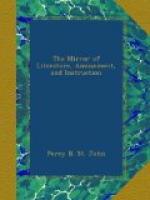[As we have said, the present is but a fourth portion of Vidocq’s exploits; and if the remaining three are of equal interest, the work will be one of the most extraordinary of our times. We scarcely remember a counterpart, although the Memoirs of James Hardy Vaux are of the same stamp. The fate of the latter work was curious enough. The manuscript was sent by the author from New South Wales, whither he had been transported. It was printed in two small volumes, and published by an eminent west-end bookseller, who, for some unexplained motive withdrew the edition, which is, we believe, now in the printer’s warehouse. The Editor of the “Autobiography” has, however, reprinted Vaux’s memoirs in his series; their style is very superior to that of Vidocq’s, (which is a translation) and as scores of worse books are printed annually, we rejoice at their rescue from oblivion.]
* * * * *
THE ANECDOTE GALLERY.
* * * * *
WHITFIELD.
Remarkable instances are related of the manner in which Whitfield impressed his hearers. A man at Exeter stood with stones in his pocket, and one in his hand, ready to throw at him; but he dropped it before the sermon was far advanced, and going up to him after the preaching was over, he said, “Sir, I came to hear you with an intention to break your head; but God, through your ministry, has given me a broken heart.” A ship-builder was once asked what he thought of him. “Think!” he replied, “I tell you, sir, every Sunday that I go to my parish church, I can build a ship from stem to stern under the sermon; but, were it to save my soul, under Mr. Whitfield I could not lay a single plank.” Hume pronounced him the most ingenious preacher he had ever heard; and said, it was worth while to go twenty miles to hear him. But, perhaps, the greatest proof of his persuasive powers was, when he drew from Franklin’s pocket the money which that clear, cool reasoner had determined not to give; it was for the orphan-house at Savannah. “I did not,” says the American philosopher, “disapprove of the design; but as Georgia was then destitute of materials and workmen, and it was proposed to send




